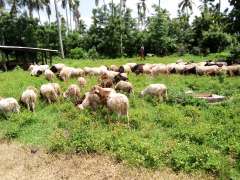Do naszych czytelników: Żałujemy, że ta treść nie jest dostępna w języku polskim.
Funded Pandemic Prevention
The Volkswagen Foundation supports new Senckenberg research project on the role of human-environment relations in the context of pandemic preparedness with more than one million euros
With a duration of four years and a total sum of around 1.5 million euros, the Volkswagen Foundation is funding a new research project at the Senckenberg Museum of Natural History in Görlitz as part of its “Social Transformation” profile sector. Led by Senckenberg scientist Prof. Dr. Hjalmar Kühl, the project will involve a team of researchers from the Helmholtz Institute for One Health, Greifswald, the University of Marburg, the University Jean Lorougnon Guédé (Daloa, Ivory Coast), the Centre Suisse des Recherches Scientifiques (CSRS, Ivory Coast), and the Ecole Inter Etats des Sciences et Médecine Vétérinaires de Dakar (Senegal). Their goal is to motivate people to change their current behavior, thereby bringing about changes to reduce the risk of zoonotic diseases – the mutual transmission of disease from animals to humans – in West Africa. The project aims at providing concrete solutions for greater sustainability, taking into account the urgent social, environmental, health and economic needs of all stakeholders.
The Sars-CoV-2 coronavirus, monkeypox, or avian flu: in recent years, diseases have repeatedly been transmitted from animals to humans – sometimes with devastating global consequences. “Such zoonoses – infectious diseases caused by bacteria or viruses, for example, and transmitted between animals and humans – have always existed, but there are some factors that favor their proliferation,” explains Dr. Hjalmar Kühl, Head of the Department of Zoology at the Senckenberg Museum of Natural History in Görlitz and Professor of Mammal Diversity at the Technical University of Dresden, and he continues, “The world’s population is growing steadily, people are living in confined spaces and travel more, and the living space of many wild animal species is becoming smaller and smaller and overlaps with that of farm animals and of us humans. In our new project, generously funded by the Volkswagen Foundation, we will investigate how the risk of zoonotic diseases can be prevented by changing or reducing the consumption of wild animals in different habitats in West Africa.”
The project addresses the question of how the consumption of wild meat, such as cane rats, porcupines, primates, flying foxes, or antelopes, differs between rural areas, agroforestry landscapes, and (peri)urban areas in Liberia and Ivory Coast. In addition, the African-German research team wants to examine how targeted measures, such as education about infection risks or subsidizing farmed animals instead of consuming wild meat, could change eating behaviors. “The issue of consuming wild meat is complex, with no simple solutions, and therefore requires collaboration between different experts from the fields of biodiversity (Senckenberg and University Daloa), behavioral economy (University Marburg), anthropology (CSRS) and zoonosis research (Helmholtz Institut für One Health und Ecole Inter Etats des Sciences et Médecine Vétérinaires de Dakar). That is why we also work closely with restaurant owners, citizens, traders, and breeders of wild animals, among others. That way, the reasons for the consumption of wild animals can be determined and measures to bring about a change of behavior under given conditions can be identified,” says anthropologist Gilbert Fokou from CSRS.
The studies will be accompanied by surveys on the presence of wild animals and a search for pathogens. “Our work will show the effectiveness of potential measures – step-by-step replacement of wild meat with farmed animals, education and media outreach regarding the risks posed by zoonoses and the loss of biodiversity or subsidies – for a societal transformation process and demonstrate the potential for a change in wild animal consumption. This will lead to concrete solutions for increased sustainability, considering the various needs of all stakeholders,” explains veterinarian Andrée Prisca Ndour.
The project is funded within the framework of the Volkswagen Foundation’s “Social Transformation” profile sector. There, the foundation supports research that expands and critically reflects the body of knowledge on transformation processes with different points of emphasis. The aim is to gain a better understanding of how transformation processes take place and what opportunities exist for science to influence and shape these.


